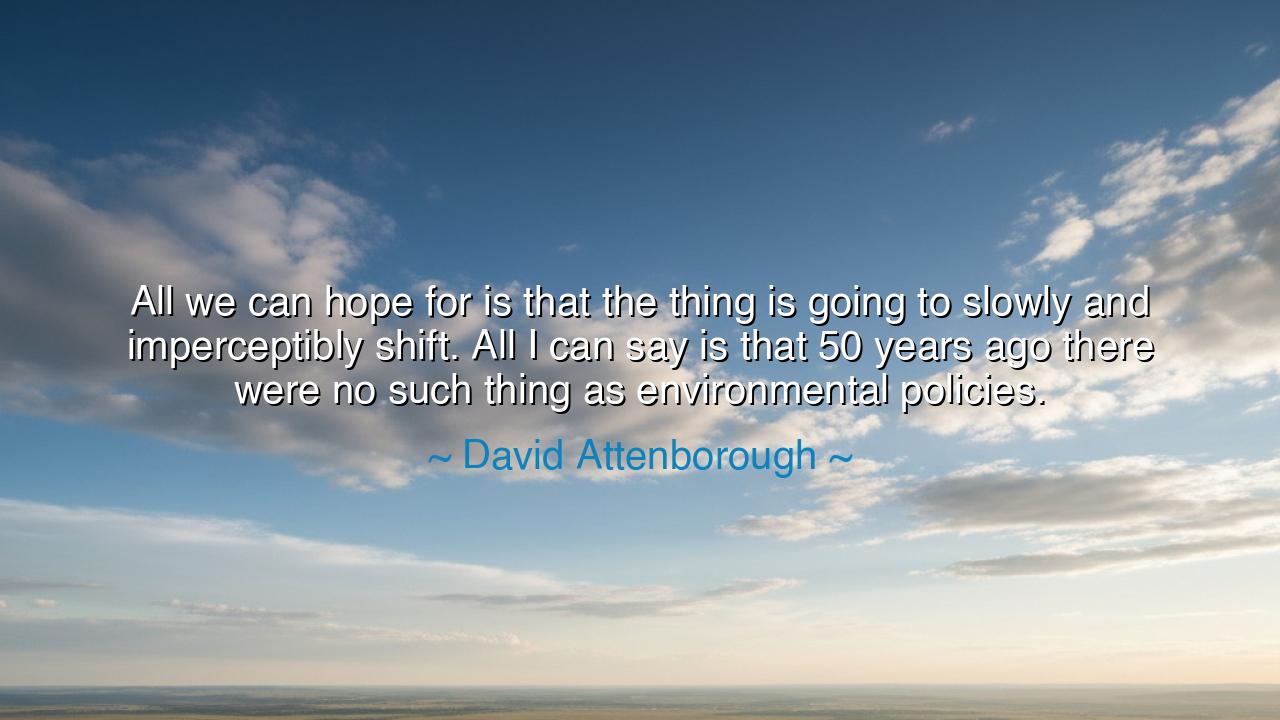
All we can hope for is that the thing is going to slowly and
All we can hope for is that the thing is going to slowly and imperceptibly shift. All I can say is that 50 years ago there were no such thing as environmental policies.






In a voice filled with patience and quiet power, David Attenborough once said, “All we can hope for is that the thing is going to slowly and imperceptibly shift. All I can say is that 50 years ago there were no such thing as environmental policies.” These words, spoken not in anger but in weary wisdom, reflect the heart of a man who has spent his life witnessing both the splendor and the suffering of the natural world. In them lies both a warning and a hope—a recognition that change, though slow, is possible, and that progress, though imperceptible at first, begins with awareness. Attenborough, the gentle herald of nature, reminds us that the transformation of humanity’s relationship with the Earth is not a moment of revolution, but a long awakening of the soul.
The origin of this quote arises from Attenborough’s lifelong journey as a naturalist and storyteller. Over decades, he traveled from the depths of the oceans to the summits of the mountains, observing the great tapestry of life—and, increasingly, the wounds humanity has inflicted upon it. When he first began his career, the concept of environmental policy was unknown. The earth was seen as endless in its bounty, the sky boundless in its capacity to absorb our smoke. But as the years passed, the consequences of ignorance became visible: rivers choked with filth, forests felled in silence, species vanishing into memory. Attenborough’s words thus come from experience, not despair. He speaks as one who has seen the arc of history bend slowly toward awareness, and who knows that even the gentlest curve is a miracle worth guarding.
When he says that “all we can hope for is that the thing is going to slowly and imperceptibly shift,” he speaks to the nature of change itself. True transformation—whether in civilizations or in souls—rarely bursts forth in an instant. It creeps like dawn across the horizon, subtle but unstoppable. The old ways resist; the new ways take root only in patience. Attenborough’s wisdom recalls the lesson of the ancients: that time is the great sculptor, and endurance the greatest strength. For just as the river carves the canyon not in days but in ages, so too must humanity’s conscience be shaped by years of effort, education, and reflection.
History gives us proof of this slow evolution. Half a century ago, as Attenborough reminds us, no nation spoke of environmental protection. The oceans were treated as infinite dumps, the skies as bottomless sinks for smoke. Then, a few voices began to rise—scientists, poets, and ordinary citizens who refused to turn away. The first Earth Day in 1970 gathered millions in protest and hope. The birth of agencies like the Environmental Protection Agency in the United States, and the passage of laws safeguarding air and water, marked the beginning of a new consciousness. Change did not arrive in triumph, but in steady footsteps. The tide began to turn, imperceptibly at first, then undeniably. Attenborough’s words honor this lineage of patience—those who worked not for applause, but for the unseen future.
Yet his tone is not one of complacency, but of humility. To say that the shift is “slow and imperceptible” is to acknowledge that progress is fragile. It can be reversed by greed, forgotten in comfort, or ignored in haste. The modern age, dazzled by technology, still teeters between preservation and destruction. Attenborough’s message is thus not only a reflection but a call—a reminder that every generation must rekindle its awareness, must nurture the movement lest it falter. He teaches us that the fight for the planet is not a sprint, but an unending pilgrimage, carried forward by those who believe even when results seem invisible.
In this sense, Attenborough stands among the philosophers and prophets of old. Like Lao Tzu, who taught that great journeys begin with a single step, he urges faith in the quiet momentum of good deeds. Like Marcus Aurelius, he understands that endurance is the noblest form of strength. His voice, calm yet commanding, is not that of a revolutionary shouting for upheaval, but of a sage guiding humanity through its moral evolution. The environmental awakening he speaks of is not merely political—it is spiritual. It asks us to remember that the Earth is not a resource but a relative, not a possession but a partner.
Let this, then, be the lesson drawn from Attenborough’s words: that lasting change comes not from rage, but from reverence; not from impatience, but from persistence. The world will not heal overnight, but it will heal through a thousand acts of care, through education, through compassion, through the slow awakening of hearts. The task before us is not to demand instant redemption, but to ensure that every action, every policy, every generation moves the wheel forward, however imperceptibly.
So remember, children of tomorrow: hope is the soil in which progress grows. Plant it daily. Water it with effort. Guard it against despair. For though the change may seem invisible, it is always unfolding, like spring beneath the snow. And when future generations walk upon a greener earth, they will owe their inheritance to the patience of those who refused to give up, who, like David Attenborough, believed that even the slowest shift can change the course of the world.






AAdministratorAdministrator
Welcome, honored guests. Please leave a comment, we will respond soon